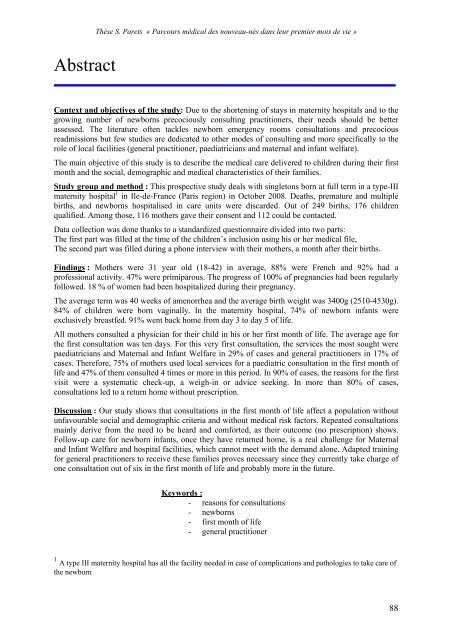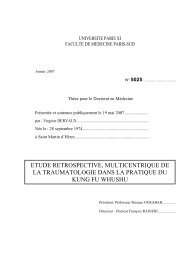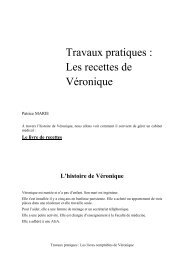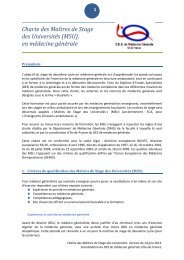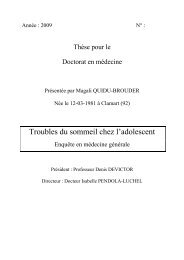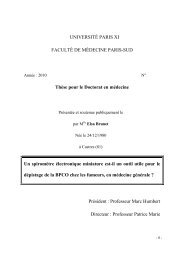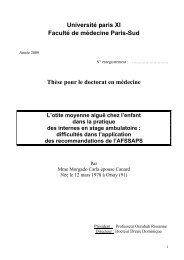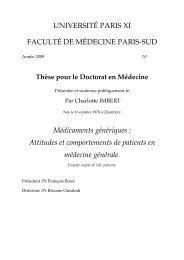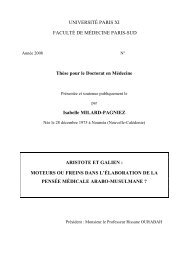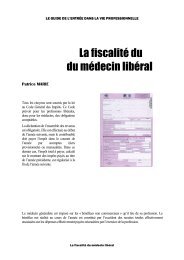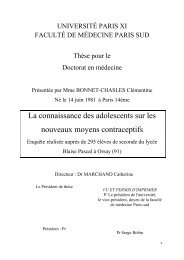PARETS Sandra
PARETS Sandra
PARETS Sandra
You also want an ePaper? Increase the reach of your titles
YUMPU automatically turns print PDFs into web optimized ePapers that Google loves.
Thèse S. Parets « Parcours médical des nouveau-nés dans leur premier mois de vie »AbstractContext and objectives of the study: Due to the shortening of stays in maternity hospitals and to thegrowing number of newborns precociously consulting practitioners, their needs should be betterassessed. The literature often tackles newborn emergency rooms consultations and precociousreadmissions but few studies are dedicated to other modes of consulting and more specifically to therole of local facilities (general practitioner, paediatricians and maternal and infant welfare).The main objective of this study is to describe the medical care delivered to children during their firstmonth and the social, demographic and medical characteristics of their families.Study group and method : This prospective study deals with singletons born at full term in a type-IIImaternity hospital 1 in Ile-de-France (Paris region) in October 2008. Deaths, premature and multiplebirths, and newborns hospitalised in care units were discarded. Out of 249 births, 176 childrenqualified. Among those, 116 mothers gave their consent and 112 could be contacted.Data collection was done thanks to a standardized questionnaire divided into two parts:The first part was filled at the time of the children’s inclusion using his or her medical file,The second part was filled during a phone interview with their mothers, a month after their births.Findings : Mothers were 31 year old (18-42) in average, 88% were French and 92% had aprofessional activity. 47% were primiparous. The progress of 100% of pregnancies had been regularlyfollowed. 18 % of women had been hospitalized during their pregnancy.The average term was 40 weeks of amenorrhea and the average birth weight was 3400g (2510-4530g).84% of children were born vaginally. In the maternity hospital, 74% of newborn infants wereexclusively breastfed. 91% went back home from day 3 to day 5 of life.All mothers consulted a physician for their child in his or her first month of life. The average age forthe first consultation was ten days. For this very first consultation, the services the most sought werepaediatricians and Maternal and Infant Welfare in 29% of cases and general practitioners in 17% ofcases. Therefore, 75% of mothers used local services for a paediatric consultation in the first month oflife and 47% of them consulted 4 times or more in this period. In 90% of cases, the reasons for the firstvisit were a systematic check-up, a weigh-in or advice seeking. In more than 80% of cases,consultations led to a return home without prescription.Discussion : Our study shows that consultations in the first month of life affect a population withoutunfavourable social and demographic criteria and without medical risk factors. Repeated consultationsmainly derive from the need to be heard and comforted, as their outcome (no prescription) shows.Follow-up care for newborn infants, once they have returned home, is a real challenge for Maternaland Infant Welfare and hospital facilities, which cannot meet with the demand alone. Adapted trainingfor general practitioners to receive these families proves necessary since they currently take charge ofone consultation out of six in the first month of life and probably more in the future.Keywords :- reasons for consultations- newborns- first month of life- general practitioner1 A type III maternity hospital has all the facility needed in case of complications and pathologies to take care ofthe newborn88


